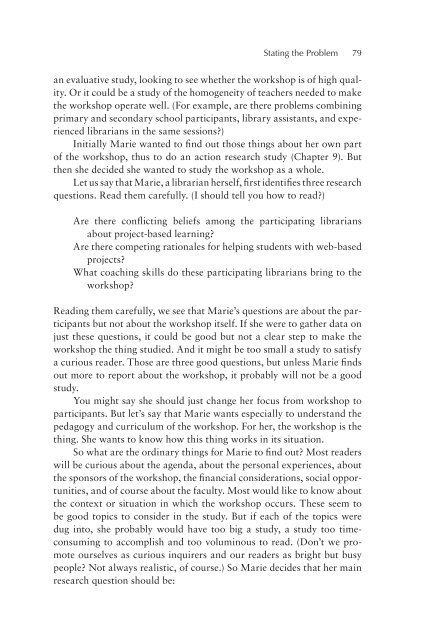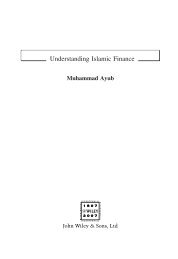How Things Work - Doha Academy of Tertiary Studies
How Things Work - Doha Academy of Tertiary Studies
How Things Work - Doha Academy of Tertiary Studies
You also want an ePaper? Increase the reach of your titles
YUMPU automatically turns print PDFs into web optimized ePapers that Google loves.
Stating the Problem 79<br />
an evaluative study, looking to see whether the workshop is <strong>of</strong> high quality.<br />
Or it could be a study <strong>of</strong> the homogeneity <strong>of</strong> teachers needed to make<br />
the workshop operate well. (For example, are there problems combining<br />
primary and secondary school participants, library assistants, and experienced<br />
librarians in the same sessions?)<br />
Initially Marie wanted to find out those things about her own part<br />
<strong>of</strong> the workshop, thus to do an action research study (Chapter 9). But<br />
then she decided she wanted to study the workshop as a whole.<br />
Let us say that Marie, a librarian herself, first identifies three research<br />
questions. Read them carefully. (I should tell you how to read?)<br />
Are there conflicting beliefs among the participating librarians<br />
about project-based learning?<br />
Are there competing rationales for helping students with web-based<br />
projects?<br />
What coaching skills do these participating librarians bring to the<br />
workshop?<br />
Reading them carefully, we see that Marie’s questions are about the participants<br />
but not about the workshop itself. If she were to gather data on<br />
just these questions, it could be good but not a clear step to make the<br />
workshop the thing studied. And it might be too small a study to satisfy<br />
a curious reader. Those are three good questions, but unless Marie finds<br />
out more to report about the workshop, it probably will not be a good<br />
study.<br />
You might say she should just change her focus from workshop to<br />
participants. But let’s say that Marie wants especially to understand the<br />
pedagogy and curriculum <strong>of</strong> the workshop. For her, the workshop is the<br />
thing. She wants to know how this thing works in its situation.<br />
So what are the ordinary things for Marie to find out? Most readers<br />
will be curious about the agenda, about the personal experiences, about<br />
the sponsors <strong>of</strong> the workshop, the financial considerations, social opportunities,<br />
and <strong>of</strong> course about the faculty. Most would like to know about<br />
the context or situation in which the workshop occurs. These seem to<br />
be good topics to consider in the study. But if each <strong>of</strong> the topics were<br />
dug into, she probably would have too big a study, a study too timeconsuming<br />
to accomplish and too voluminous to read. (Don’t we promote<br />
ourselves as curious inquirers and our readers as bright but busy<br />
people? Not always realistic, <strong>of</strong> course.) So Marie decides that her main<br />
research question should be:

















